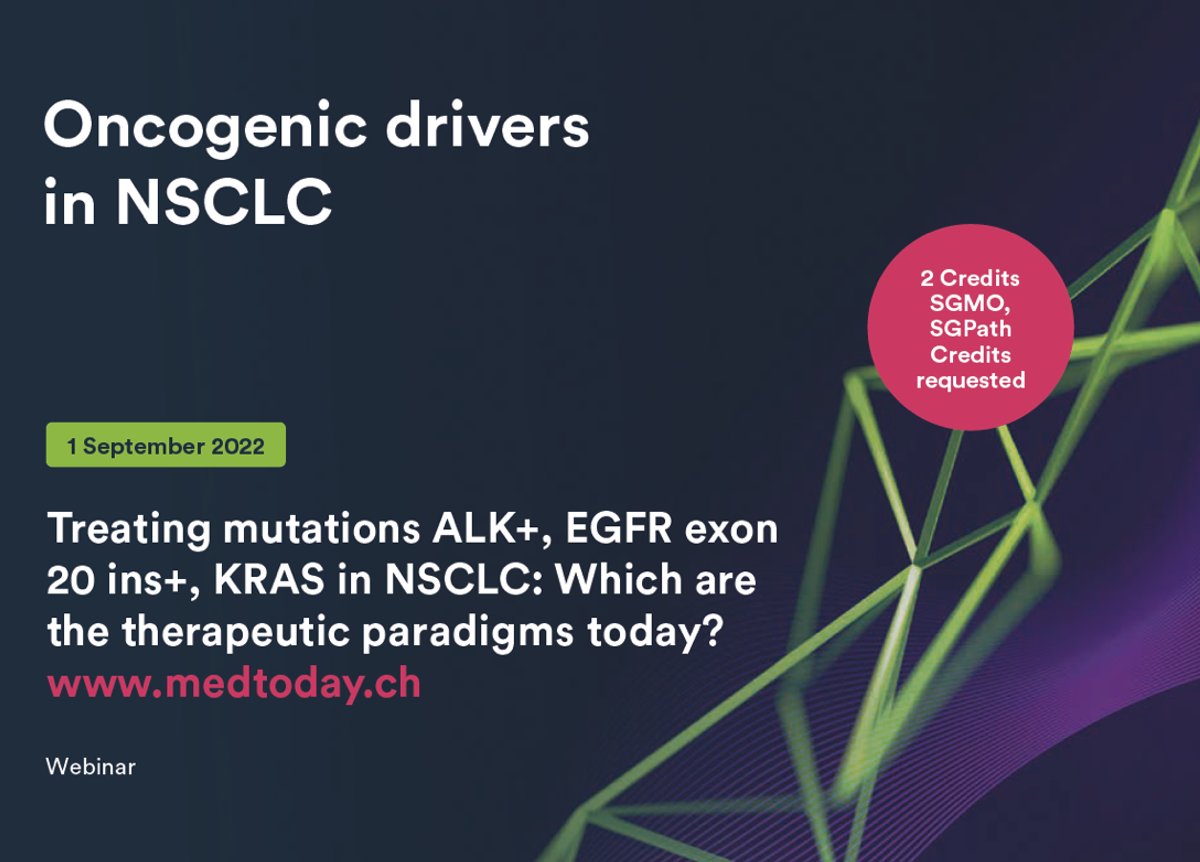Next-generation ALK inhibitors could become the first-line treatment for ALK-positive NSCLC. Dr. Alfredo Addeo called the ALEX trial the trial that “dramatically changed our practice.”
Dr. Alfredo Addeo, Consultant medical oncologist leading the thoracic malignancy team at Hôpitaux Universitaires Genève and one of Oncology Compass’ scientific leaders, held a presentation as part of Medtoday’s “Oncogenic drivers in NSCLC” webinar series about therapy considerations for ALK-positive non-small cell lung cancer (NSCLC) patients. The Medtoday platform reports about the most important medical congresses and creates events for year-round knowledge exchange through innovative formats.
Dr. Addeo introduced the most significant practice-changing trials for ALK-positive non-small cell lung cancer which indicate that next-generation ALK inhibitors are suitable for first-line treatment of this patient group. According to Dr. Addeo’s professional experience, treatment with alectinib has significantly changed the oncology practice for this type of cancer.

On-target Resistance Alterations
At the beginning of the presentation, he highlighted that ALK rearrangements occur in 3–7% of patients with NSCLC1 and presented the results of the PROFILE 1007, PROFILE 1014, and PROFILE 1029 trials. These trials demonstrated that the treatment of patients with ALK-positive NSCLC was significantly improved by crizotinib compared to chemotherapy. Despite initial significant responses to crizotinib, most patients develop crizotinib resistance within the first year.[1] Dr. Addeo pointed out the fact that on-target resistance alterations are found in almost one-third of crizotinib-resistant patients.
In the following section, Dr. Addeo discussed ceritinib, alectinib, brigatinib, ensartinib, and lorlatinib which were developed as next-generation ALK inhibitors to overcome crizotinib-resistant mutations.
The ALEX Trial
The ALEX phase III trial authored by Prof. Dr. Solange Peters, Dr. Addeo presented with the words: “The trial that dramatically changed our practice.” In this study, 303 patients with previously untreated, advanced ALK-positive NSCLC were randomly assigned to receive either alectinib (600 mg twice daily) or crizotinib (250 mg twice daily). Alectinib showed activity against central nervous system disease and superior efficacy as well as lower toxicity than crizotinib in the primary treatment of ALK-positive NSCLC.[2]
The ALTA-1L Trial
Dr. Addeo also highlighted the ALTA-1L final analysis. In this phase III study, 275 patients with advanced ALK-positive NSCLC were randomly assigned to receive either brigatinib 180 mg once daily or crizotinib 250 mg twice daily. Brigatinib demonstrated superior efficacy and tolerability versus crizotinib in patients with or without poor prognostic biomarkers.[3]
“Now we have at least two drugs that are very effective and with brain activity.” – Dr. Addeo concluded.
The eXalt3 Trial
Following that, the phase III eXalt3 trial was discussed. In this study, ensartinib and crizotinib were compared as first-line treatments in patients with advanced, recurrent, or metastatic NSCLC. Ensartinib significantly improved progression-free survival and was associated with a higher rate of intracranial response compared to crizotinib.[4]
The CROWN Trial
The CROWN trial was presented last but not least. This phase III trial compared lorlatinib with crizotinib in 296 patients with advanced ALK-positive NSCLC who had received no previous systemic treatment for metastatic disease. Lorlatinib showed significantly longer progression-free survival and a higher frequency of intracranial response versus crizotinib. Dr. Addeo pointed out that the incidence of grade 3 or 4 adverse events was higher with lorlatinib than with crizotinib.[5]
Conclusions
Dr. Addeo concluded the presentation with a thought: “Next-generation ALK inhibitors incredibly moved forward. We have very good drugs as first-line.”

Prof. Solange Peters closed the discussion by asking Dr. Addeo, “What would you give first in September 2022?”
“It is a difficult question. I struggle to identify the patients to whom I would give loratinib today given my personal experience with alectinib. Maybe the patients with a lot of brain metastases. But today if I saw a new patient, I would be tempted to continue with alectinib because as I mentioned before, satisfactory safety profile, activity is good, longer follow-up, and no interaction with other drugs.” Dr. Addeo explained.
“Why don’t you use brigatinib?” Dr. Peters added.
“That would be a good option. That would be more tempting to me than using loratinib, but I am always concerned about what will I do next. If I use brigatinib I think that likely loratinib would be effective afterward, so brigatinib would be a good option.” Dr. Addeo elaborated.
Dr. Addeo’s full presentation can be watched here: https://medtoday.ch/congresses/mutations-nsclc-2022/onDemand/90
REFERENCES:
- Sullivan I, Planchard D. ALK inhibitors in non-small cell lung cancer: the latest evidence and developments. Ther Adv Med Oncol. 2016 Jan;8(1):32-47.
- Solange P., Camidge, D. Ross, Shaw, A. T., Gadgeel, S., Ahn, Jin S., Kim, Dong-Wan, et al. Alectinib versus Crizotinib in Untreated ALK-Positive Non–Small-Cell Lung Cancer. New England Journal of Medicine August 31, 2017, 377(9):829.
- Camidge, D.R., Kim, H.R., Ahn, M.J., Yang, J.C.H., Han, J.Y., Hochmair, M.J., Lee, K.H. et al. Brigatinib Versus Crizotinib in ALK Inhibitor-Naive Advanced ALK-Positive NSCLC: Final Results of Phase 3 ALTA-1L Trial. J Thorac Oncol. 2021 Dec;16(12):2091-2108.
- Horn L, Wang Z, Wu G, et al. Ensartinib vs Crizotinib for Patients With Anaplastic Lymphoma Kinase−Positive Non–Small Cell Lung Cancer: A Randomized Clinical Trial. JAMA Oncol. 2021;7(11):1617–1625.
- Shaw, A. T., Bauer, Todd M., de Marinis, F., Felip, E., Goto, Y., Liu, G. et al. First-Line Lorlatinib or Crizotinib in Advanced ALK-Positive Lung Cancer. New England Journal of Medicine November 19, 2020 383(21):2018.
